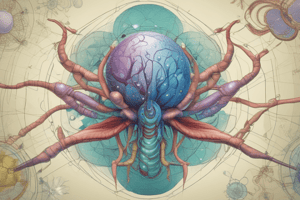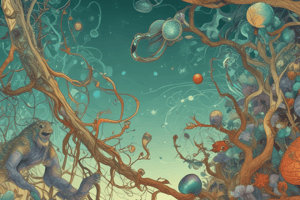Podcast
Questions and Answers
What is the primary focus of molecular biology?
What is the primary focus of molecular biology?
- Analyzing genetic makeup of species
- Studying ecosystems
- Investigating cell structures
- Exploring molecular mechanisms in biological processes (correct)
Which field of biology deals with the structure, function, and organization of cells?
Which field of biology deals with the structure, function, and organization of cells?
- Cell biology (correct)
- Ecology
- Molecular biology
- Evolutionary biology
What do cells communicate with each other through?
What do cells communicate with each other through?
- Hormones (correct)
- Neurotransmitters
- Enzymes
- Antibodies
Which area of biology focuses on interactions among living organisms and their environment?
Which area of biology focuses on interactions among living organisms and their environment?
How does evolutionary biology differ from ecology?
How does evolutionary biology differ from ecology?
Flashcards are hidden until you start studying
Study Notes
Science
Science is a vast field of human knowledge that encompasses many disciplines, each with its own unique set of laws, principles, and theories. In broad terms, science can be broken down into three main branches: natural sciences, life sciences, and social sciences. Let's explore these branches further and dive deeper into one of them – Biology.
Natural Sciences
Natural sciences study the physical world around us, including phenomena such as movement, energy, matter, and time. This branch includes fields like physics, chemistry, astronomy, geology, and environmental science. Physicists work with the fundamental components of nature - atoms, electrons, and photons - to understand how our universe operates. Chemists are devoted to understanding the structure and properties of matter. Astronomers look outward, studying celestial objects from stars to galaxies to black holes. Geologists focus on Earth's history and composition, while environmental scientists deal with current and future issues related to our environment such as climate change.
Life Sciences
The life sciences, also known as biological sciences, revolve around living organisms, their behavior, interactions, and evolution. It has several major areas including botany (the study of plants), zoology (study of animals), microbiology (study of microorganisms), ecology (interactions between living things and their environments), and genetics (study of genes). These subjects delve into various aspects of life, ranging from the smallest cells to entire ecosystems.
Biology: A Closer Look
Biology, often referred to as 'the science of life', is a core discipline within the life sciences. It deals with the study of living organisms, covering everything from molecules and cells to populations, communities, and ecosystems. Here, we will expand upon this definition by exploring some key concepts and subfields:
Molecular Biology
Molecular biology is the cornerstone of contemporary life sciences and it focuses on the molecular mechanisms underlying biological processes and functions. Key areas include gene expression, protein synthesis, DNA replication, and cellular signaling pathways. Understanding these processes helps researchers develop new therapies and treatments for diseases as well as advance our understanding of how life works.
Cell Biology
Cell biology investigates the structure, function, and organization of cells, which serve as the basic units of life. Cells have specialized roles within multicellular organisms; they communicate with other cells through chemical signals called hormones and participate in complex processes like wound healing, immune response, and reproduction.
Ecology & Evolutionary Biology
Ecology studies interactions among living organisms and their environment, while evolutionary biology examines how these interactions shape the genetic makeup of species over time. Together, they reveal how diverse species have adapted to different habitats, leading to the incredible array of life forms on Earth today.
In conclusion, science encompasses a wide range of interconnected fields, all seeking to unravel mysteries of our world. Whether you're fascinated by the tiniest details of cell biology or the grand scale of cosmic exploration, there's something for everyone within the scientific realm.
Studying That Suits You
Use AI to generate personalized quizzes and flashcards to suit your learning preferences.




